- Home
- Naguib Mahfouz
Arabian Nights and Days Page 5
Arabian Nights and Days Read online
Page 5
“But you are chasing away the noble voices just as you do honest men.”
“I put myself on trial,” he said challengingly.
“Make plain what you mean.”
“Put your power to supporting me rather than thwarting me.”
“What do you want?”
“To do away with the criminals and to rule the people justly and honestly.”
A peal of laughter rang out, filling the universe.
“You would like to double-cross me in order to realize your hidden dreams of power and authority.”
“As a method, not as a goal.”
“Your heart is still sunk in bondage.”
“Try me out if you wish.”
“I am a believing genie and I never overstep the bounds.”
“Then remove yourself in peace from my path,” said Gamasa once more, in despair.
“The fact is that I thought tranquilly on top of the mountains of Qaf and was persuaded that you had rendered me a service that cannot be gainsaid, even though unintended. I have thus decided to return the favor with a like one and not to overstep the bounds.”
“But you are doing the very opposite of what you intended.”
“How stupid you are!”
“Explain your purpose to me,” he pleaded.
“You have a mind, a will, and a soul.”
He was about to plead more with him but the genie let out a scornful laugh, then quickly withdrew his presence and vanished.
Gamasa al-Bulti awoke to a knocking at the door. His deputy walked in to inform him he was summoned to meet the governor al-Hamadhani.
XI
He wished he had been left to himself to think things over, but he had no choice but to go. He expected no good at all to come from the meeting. The flashes of hope in the autumn sky disappeared and the drums of victory fell silent. He would seesaw for a long time between the governor and Singam’s pranks. He plunged into a bottomless pool of speculation as he rode on his mule along the road to the house of government, the way filled with movement and sound. He was encompassed by life’s demands, followed scornfully by people’s eyes. No joys or delusions: the days of pride had come to an end. A despised person feeding off ignominy—that is what Singam had persuaded him he was. His sole consolation was that he was the sword of state. But the sword had become blunt and security had broken down, so of what consequence was he? A murderous robber, protector of criminals, torturer of innocent men. He had forgotten God until he had been reminded of Him by a genie.
XII
He found Khalil al-Hamadhani standing in the middle of the reception hall like a spear ready for battle.
“The peace of God be upon you, O Emir,” said Gamasa gently, to which the governor shouted in a voice trembling with rage, “Peace with your presence is nonexistent!”
“I work myself to death.”
“And so the jewels of my women are stolen from within my own house!”
This was more than he expected. He wondered what Singam had been up to. He was dumbstruck.
“You’re nothing but a useless hashish addict, an associate of thieves.”
“I’m the chief of police,” he said in a gruff voice.
“We’ll meet up in the evening,” shouted the governor, “or I’ll sack you and cut off your head.”
XIII
What was the point of searching? What could his men do in the face of Singam’s power? He would be dismissed and would lose his honor, also his head. It was a fate to which he had often dispatched other people, so how could he blame him? But Gamasa would not accept his fate without defending himself—and fiercely too. Here was his life spread out before his eyes like a page: a concrete and terrifying testimony. It had started with a pact with God and had ended with one with the Devil. He had to topple it before death. The thought of the sheikh came to him like a stray breeze on a scorching summer’s day: it blew, borne along on pure thoughts of nostalgia. He said to himself, “This is his time.” He drew him forth from his deepest depths when his sorrows had ripped apart the solid crust besmirched with blood.
He found him in the simple reception room, as though expecting him. He bent over his head, silently, then squatted down on a cushion in front of him. Memories were inhaled like the perfume of a wilted rose, and in the empty space there materialized before him the verses of the Quran and the Sayings of the Prophet and the remnants of good intentions, like drops of blood. He drank his fill from the immanence of the divinely inspired peace until he was overcome with a sense of shame.
“I can read your feelings toward me, master,” he said sadly.
“The knowledge of that is with God alone,” said Abdullah al-Balkhi with his immutable calm, “so do not claim that of which you have no knowledge.”
“In people’s opinion,” he said sadly, “I am a bloodthirsty policeman.”
“Why, I wonder, do shedders of blood visit me?”
“How pleasant you are, master,” he said, having taken heart. “The fact is, I have a story I would like you to hear.”
“I have no desire to hear it,” he said haughtily.
“I must make a decision and in no way can its significance be understood without the story being told.”
“The decision is sufficient for an understanding of the story.”
“The matter requires taking counsel,” he said uneasily.
“No, it’s your decision alone.”
“Listen to my extraordinary story,” he pleaded.
“No. One sole thing concerns me,” he said calmly.
“What is it, master?”
“That you take your decision for the sake of God alone.”
“It’s for this reason that I am in need of your opinion,” he said helplessly.
The sheikh said with resolute calm, “The story is yours alone and the decision yours alone.”
XIV
He left the sheikh’s house divided between doubt and certainty. It was…if the sheikh knew his story and his decision, as though he were blessing his decision provided it were for the sake of God alone. Had not despair played a role? Had not self-defense played another role? Had not desire for revenge played a third role? Would it, he wondered, diminish repentance if it were preceded by a sin? The thing to be taken into consideration was the final intention and persisting in it to the end. He was, in any case, burying the old Gamasa and evoking another one.
When he had taken his decision he gave a deep sigh of relief. His energy was redoubled. He visited his home and sat down with Rasmiya, his wife, and his daughter Akraman. His heart was flooded with mysteriously fervent emotions that made him feel his solitude more and more. Even Singam left him to his solitude. Nevertheless his resolution was final and knew no wavering. He faced the most dangerous situation in his life with rare courage and unfaltering resolve.
Returning to his place of work he freed, at his own initiative, the Shiites and Kharijites. He did this in a complete daze, and both troops and victims too were astonished at this action of his. As soon as it was evening he went to the house of government. He turned his gaze from the faces and places he met on his way as though they no longer concerned him. Finally he saw Khalil al-Hamadhani waiting with calm resoluteness, and he did not doubt that he too had arrived at a decision. The reception hall embraced them, no one being present but the human sufferings accumulated behind the cushions and fine draperies, and witnesses from all bygone generations. Exchanging no greeting, the governor coldly asked him, “What have you got to say?”
“Everything’s fine,” said Gamasa al-Bulti confidently.
“You’ve arrested the thief?” he inquired with sudden optimism.
“I’ve come for that purpose.”
The governor frowned questioningly. “Do you think he’s in my household?”
Gamasa pointed at him. “There he is,” he said, “talking unashamedly.”
“By the Lord of the Kaaba, you’ve gone crazy!” shouted Khalil al-Hamadhani, aghast.
“It is the truth being
spoken for the first time.”
As the governor prepared to take action, Gamasa drew his sword. “You’ll receive your true deserts.”
“You’ve gone crazy, you don’t know what you’re doing.”
“I am doing my duty,” he said calmly.
“Come to your senses—you’re throwing yourself into the executioner’s hands,” he said in utter confusion and terror.
Gamasa launched a lethal blow at the neck. The governor’s terrified screams mingled with his strangled bellowing as his blood spouted like a fountain.
XV
Gamasa al-Bulti was arrested and the sword snatched from his hand. He did not try to escape. He did not resist: he believed that his task had been completed. And so a sense of calm and serenity came over him, and a wave of extraordinary courage rose up that made him feel as though he were treading on his executioners, that he was greater than he imagined and that the base actions he had committed were in no way worthy of him and that submitting to their influence was a degradation that had driven him to his downfall and to being alienated from his human nature. He told himself that he was now practicing a form of worship whose purity would wash clean the filth of long years of dissipation.
With the autumnal breeze was spread the news, which became the talk of the high-class and the common folk. Consternation brought forth countless questions. Predictions conflicted and the ravings of maniacs flared up, while disorder began to sweep over the quarter and the city, its false rumors rising up to the sultan’s palace itself. The vizier Dandan soon moved to the house of government at the head of a squadron of cavalry.
XVI
In irons, Gamasa al-Bulti was brought before the throne in the Hall of Judgment. Shahriyar appeared in his red cloak which he wore when sitting in judgment, on his head a tall turban studded with rare jewels. To his right stood Dandan, to his left the men of state, while guards were ranged on both sides. Behind the throne was Rama the executioner.
The sultan’s eyes had a heavy look burdened with thought. He scrutinized the face of the chief of police for a long time, then asked him, “Do you not admit that I showed you my favor, Gamasa?”
The man answered in a strong, stirring voice. “Certainly, O Sultan.”
The sultan waited for some sign of defiance from the prisoner despite his being shackled in irons.
“Do you admit killing Khalil al-Hamadhani, my deputy in your quarter?” he asked with a frown.
“Yes, O Sultan.”
“What made you commit your repugnant crime?”
“It was to fulfill the just will of God,” he said clearly and without heed to the consequences.
“And do you know what God the Almighty wants?”
“This is what I was inspired with through an extraordinary story that changed the course of my life.”
The sultan, drawn to the word “story,” inquired, “And what was that?”
Gamasa related his tale: being born of ordinary folk; studying at the prayer room of Sheikh Abdullah al-Balkhi; leaving the sheikh after learning the rudiments of religion, reading, and writing; his strong physique that had qualified him for service in the police; being chosen to be chief of police because of his rare ability; and being corrupted step by step until with time he was the protector of the corrupt and an executioner of the people of sense and judgment; the appearance of Singam in his life; the crises he had been through; and—finally—his bloody act of repentance.
Shahriyar followed attentively, with clearly conflicting reactions to his words.
“Gamasa’s Singam following on from Sanaan al-Gamali’s Qumqam,” he said coldly. “We’ve found ourselves in the age of genies who have nothing better to do than kill governors.”
“I haven’t—and God is my witness—added a single word to the facts,” said Gamasa.
“Perhaps you are dreaming that that will save you from punishment.”
“My boldness affirms that I don’t care,” he said scornfully.
At a loss, Shahriyar said, “So let your head be cut off and hung above the door of your house, and let your properties be confiscated.”
XVII
In an underground prison, and in darkness, he fought his pains and clung to his courage. He had aroused the sultan’s ire and had triumphed over him, leaving him on his throne mumbling in defeat. Sorrowfully, he remembered Rasmiya and Akraman, while Husniya too ranged through his thoughts. His family would endure the same ignominy as had Sanaan’s, but God’s mercy was stronger than the universe. He thought that he would remain sleepless, but in fact he slept deeply, only waking at a loud noise and light from torches. Perhaps it was the morning and these were the soldiers come to lead him off to execution. The square would be crammed with people who had come out of curiosity, and there would be a mass of conflicting emotions. So be it. But what was he seeing? He was seeing the soldiers falling upon Gamasa al-Bulti with kicks, while the man woke up moaning with terror. What was the meaning of this? Was he dreaming? If that was Gamasa al-Bulti, then who was he? How was it that no one was taking any notice of him, as though he wasn’t there? Amazed, he feared he was losing his mind—perhaps he had already done so. He was seeing Gamasa al-Bulti right there in front of him. The soldiers were driving him outside. And he—unlike him—was in a state of extreme terror and collapse. He also found himself free of his bonds. Resolved to leave the prison, he followed after the others. No one paid him any attention.
The whole city was crammed into the square where the punishment was to take place—men, women, and children. In the forefront were the sultan and the men of state. The leather apron, on which the execution would be performed, lay in the middle, with, alongside it, Shabeeb Rama and a group of his assistants. Neither Rasmiya nor Akraman had come, which was good. How many of the faces he knew and had had dealings with! He moved from place to place, but no one heeded him. As for Gamasa al-Bulti, he was approaching the leather apron amid his guards. A single face often appeared to him and surprised him: it was the face of Sahloul the bric-a-brac merchant. When the moment of awesome silence took control, and the leather apron wrenched all eyes to itself, his heart beat fast and it seemed to him he would breathe his last after the other’s head had fallen. In a moment heavy with silence Shabeeb Rama’s sword was raised aloft, then brought down like a thunderbolt, the head fell, and the story of Gamasa al-Bulti was at an end.
Gamasa al-Bulti had expected death, yet he passed it by and went off. His bewilderment was redoubled as he moved among the flow of people leaving, until the square was completely empty. He asked himself, “Am I Gamasa al-Bulti?” at which the voice of Singam came in answer, “How could you doubt it?”
The man, in a state of extreme excitement, called out, “Singam, it’s you who are responsible for this miracle!”
“You are alive—all they killed was a likeness of my making.”
“I am indebted to you for my life, so don’t abandon me.”
“No,” he said distinctly, “now we’re all square. I commend you to the protection of God.”
“But how can I appear before people?” he called out in alarm.
“It is quite impossible for people to recognize you. Look in the first mirror you come across.”
* * *
* A sect of dissenters in early Islam.
The Porter
I
From above the door hung the head of Gamasa al-Bulti. Passersby looked at it, stood for a while, then went on—and Gamasa al-Bulti was one of them. They looked out of curiosity, or in pity, or gloatingly. As for him, he looked in stupefaction. He had not yet recovered from his distress on witnessing the eviction of his wife and daughter from their house. They had both passed by him without paying any heed, for he had assumed the form of a slim Ethiopian with crimpy hair and a light beard. His astonishment at his appearance did not cease, neither did his sadness for his family. He would circle round the house and listen to the conflicting comments voiced under the suspended head. The top people, like Karam al-Aseel, the druggis
t, and the draper would curse him mercilessly, while the common folk would express pity for him.
The new governor Yusuf al-Tahir, his private secretary Buteisha Murgan, and the new chief of police Adnan Shouma, supervised the confiscation of his house. He wondered what had gone to the general exchequer and how much had found its way into their pockets. He stayed close by the suspended head, looking and pondering and listening. He saw Ugr the barber saying to Ibrahim the water-carrier, pointing at the head, “They killed him for the solitary good act he did in his life.”
“Why didn’t his Muslim genie save him?” inquired the water-carrier.
“Don’t delve into what you don’t know,” warned the barber, and Ma’rouf the cobbler confirmed his words.
Gamasa saw Sahloul the bric-a-brac merchant looking at the head with little concern and remembered his extraordinary energy on the day of the execution. When the merchant was on his own, he approached him and asked, “Can you not enlighten a stranger with the story of whose head this was?”
Sahloul glared at him with a look that sent shivers through his body. He felt that it penetrated to his depths, and the man took on for him an even greater mystery. As he made off, Sahloul said, “I know no more about him than others do.”
Gamasa followed him with his eyes until he disappeared, then said to himself, “Perhaps he thinks himself too big to talk to a foreign Ethiopian.”
He recollected his long history as a former policeman knowledgeable about people’s circumstances, and he acknowledged that Sahloul had been the only influential merchant not to have formed a suspect relationship with him or with the governor. But he soon forgot him in the crush of his reflections. Then he saw Ragab the porter joining the group of Ugr, Ibrahim, and Ma’rouf, and he went up to him, impelled by a plan he had already worked out. He greeted him and said, “I’m an émigré Ethiopian and I want to work as a porter.”

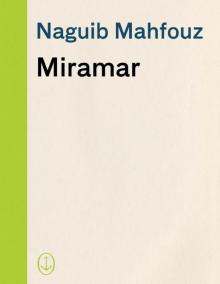 Miramar
Miramar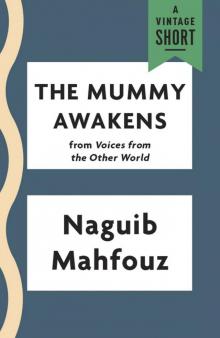 The Mummy Awakens
The Mummy Awakens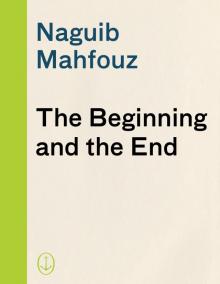 The Beginning and the End
The Beginning and the End Respected Sir, Wedding Song, the Search
Respected Sir, Wedding Song, the Search The Mirage
The Mirage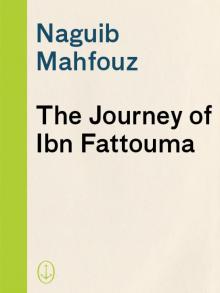 Novels by Naguib Mahfouz
Novels by Naguib Mahfouz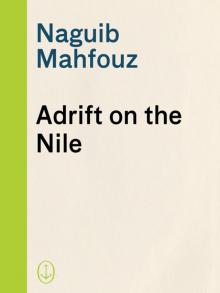 Adrift on the Nile
Adrift on the Nile Karnak Café
Karnak Café Heart of the Night
Heart of the Night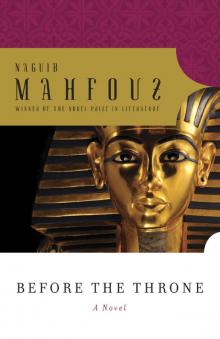 Before the Throne
Before the Throne The Time and the Place: And Other Stories
The Time and the Place: And Other Stories Cairo Modern
Cairo Modern Arabian Nights and Days
Arabian Nights and Days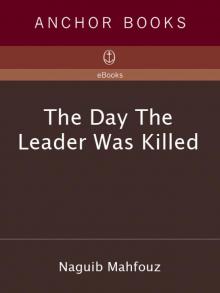 The Day the Leader Was Killed
The Day the Leader Was Killed Morning and Evening Talk
Morning and Evening Talk Three Novels of Ancient Egypt Khufu's Wisdom
Three Novels of Ancient Egypt Khufu's Wisdom Akhenaten: Dweller in Truth
Akhenaten: Dweller in Truth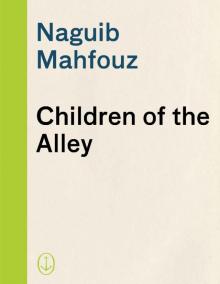 Children of the Alley
Children of the Alley Voices From the Other World
Voices From the Other World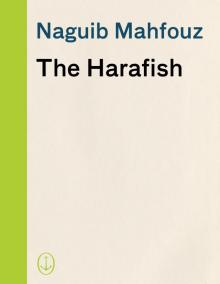 The Harafish
The Harafish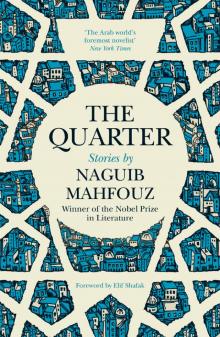 The Quarter
The Quarter The Seventh Heaven: Supernatural Tales
The Seventh Heaven: Supernatural Tales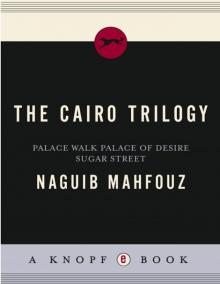 The Cairo Trilogy: Palace Walk, Palace of Desire, Sugar Street
The Cairo Trilogy: Palace Walk, Palace of Desire, Sugar Street Khan Al-Khalili
Khan Al-Khalili Three Novels of Ancient Egypt Khufu's Wisdom, Rhadopis of Nubia, Thebes at War
Three Novels of Ancient Egypt Khufu's Wisdom, Rhadopis of Nubia, Thebes at War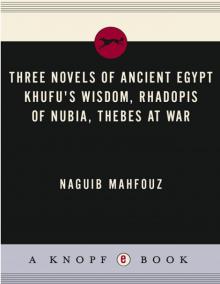 Three Novels of Ancient Egypt
Three Novels of Ancient Egypt The Time and the Place
The Time and the Place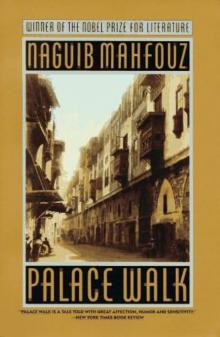 Palace Walk tct-1
Palace Walk tct-1 Akhenaten
Akhenaten The Seventh Heaven
The Seventh Heaven The Thief and the Dogs
The Thief and the Dogs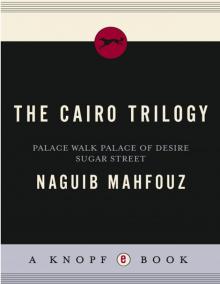 The Cairo Trilogy
The Cairo Trilogy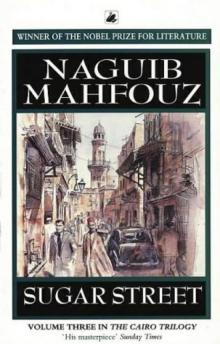 Sugar Street tct-3
Sugar Street tct-3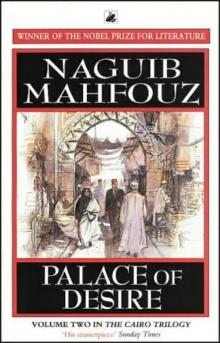 Palace of Desire tct-2
Palace of Desire tct-2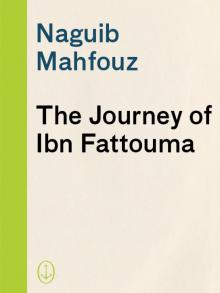 The Journey of Ibn Fattouma
The Journey of Ibn Fattouma